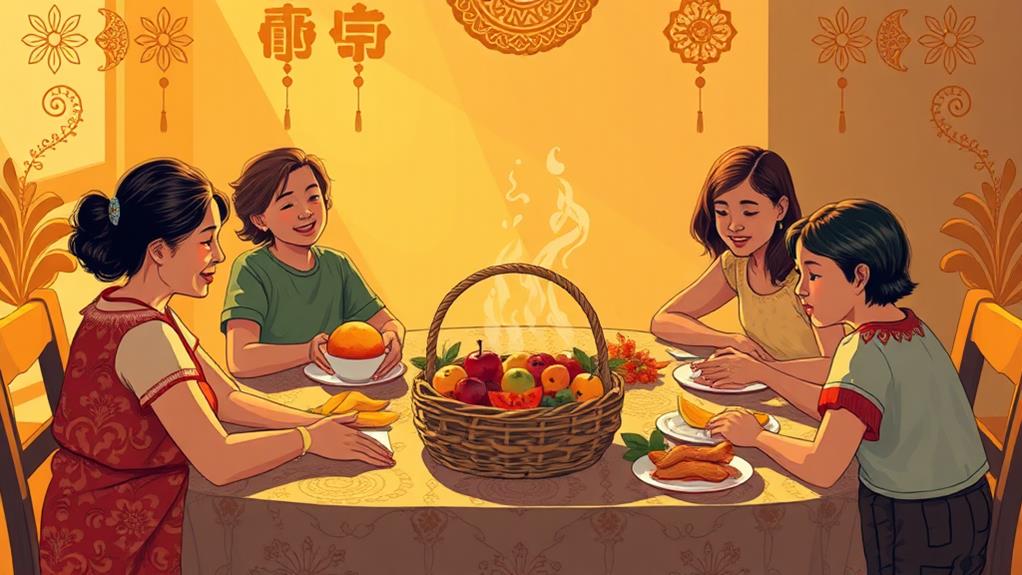Utang Na Loob: A Filipino Concept of Debt of Gratitude
Filipino culture values strong social bonds and loyalty, which is reflected in the concept of Utang Na Loob, or debt of gratitude. This concept emphasizes the importance of reciprocity and gratitude in relationships.
Failing to reciprocate kindness can lead to social stigma and loss of respect.
Utang Na Loob recognizes the emotional aspects of relationships. It encourages people to foster deeper connections through practices like pakikisama, which means adjusting to the norms and values of a group to maintain harmony, and pasalubong, which involves bringing gifts or souvenirs to show appreciation for others.
These practices help build meaningful relationships and strengthen social bonds.
Understanding Utang Na Loob is essential to navigating obligations and embracing Filipino cultural heritage. By recognizing the importance of gratitude and reciprocity, individuals can build stronger, more meaningful relationships and contribute to the rich cultural tapestry of the Filipino identity.
Understanding Utang Na Loob

Utang Na Loob: A Guiding Principle of Filipino Culture
Utang na loob is a fundamental concept in Filipino culture that emphasizes the importance of reciprocity and gratitude in interpersonal relationships. This concept, also known as "debt of the heart," highlights the obligation to repay acts of kindness and generosity received from others.
The Term's Origins and Meaning
The term utang na loob is derived from Tagalog, where utang means debt, na is a connective particle, and loob refers to one's inner self or heart.
Cultural Significance
Utang na loob is deeply rooted in Filipino culture, reflecting values of loyalty, reciprocity, and the importance of maintaining strong social bonds within families and communities.
Failing to acknowledge or reciprocate acts of kindness can lead to social stigma, as utang na loob is considered a vital aspect of respect and honor in Filipino society.
Practical Applications
Understanding utang na loob provides insight into the intricate web of relationships and social dynamics that shape Filipino culture.
For example, if a friend helps you move into a new apartment, you'd be expected to return the favor in the future, such as by helping them with a task or providing emotional support.
This reciprocal relationship strengthens social bonds and demonstrates respect for one another.
Cultural Significance and Impact
Utang na Loob: The Cultural Significance
Utang na loob has a profound impact on Filipino culture and society, reflecting values of loyalty and reciprocity that are integral to interpersonal relationships and community cohesion.
Cultural Expressions of Utang na Loob
Utang na loob is expressed through various cultural practices that foster strong social bonds within communities.
Pakikisama, or getting along with others to maintain harmony and avoid conflict, is a key aspect of utang na loob.
Additionally, pasalubong, or bringing gifts to show appreciation and strengthen relationships, is a common practice.
Community involvement, such as participating in community events and activities to demonstrate gratitude and support, is also a vital expression of utang na loob.
Influence on Social Relationships
Through these cultural expressions, utang na loob promotes a sense of mutual support and cooperation within communities.
While it can create complex dynamics, utang na loob remains a vital aspect of Filipino culture, influencing how individuals interact with one another and navigate their social relationships.
It shapes values and behavior, particularly for Filipino-Americans as they navigate their cultural identity.

Understanding Utang Na Loob Relationships
Balancing Obligations and Expectations
In utang na loob relationships, a delicate balance of obligations and expectations exists.
You must consider the weight of your obligations to return kindness and favors, while also being cautious not to let others take advantage of your goodwill.
Open Communication is Key
Open communication is crucial in utang na loob relationships.
Discuss your expectations regarding help and support with your loved ones to avoid feelings of helplessness or dependency. This understanding helps maintain healthy relationships built on mutual respect and reciprocity.
Finding a Balance
Failure to reciprocate can lead to social stigma, so it's essential to find a balance between honoring your commitments and protecting your own interests.
Interpersonal Dynamics and Justice
Navigating the complexities of utang na loob relationships requires balancing obligations and expectations, which intersects with notions of justice. Utang na loob promotes social cohesion and builds trust within communities, going beyond mere reciprocity.
Understanding utang na loob is crucial for interpersonal justice because it distinguishes between debts of good will and debts of ill will. In utang na loob relationships, authentic connections are fostered where the expectation of reciprocity is self-imposed by the beneficiary, rather than demanded by the benefactor.
For instance, when a friend helps you move into a new apartment, you feel obligated to return the favor because you value the friendship, not because they demanded it.
In contrast, true benefactors act without expecting compensation, whereas manipulative circumstances can lead to exploitative relationships. Recognizing the relational dynamics involved in utang na loob helps you navigate complex social situations, promoting justice and fairness in your interactions.
This awareness enables you to identify when someone is genuinely helping you or trying to manipulate you into a debt of ill will.
Embracing Filipino Cultural Values

Filipino Cultural Values Emphasize Reciprocity and Appreciation
In Filipino culture, utang na loob is a vital concept that revolves around reciprocity and appreciation, maintaining social bonds through acts of kindness and gratitude. This cultural value is essential for building strong relationships, as it fosters a sense of harmony and strengthens community ties.
Cultural Practices Reflect Utang na Loob
Filipino cultural practices, such as pakikisama (getting along) and pasalubong (bringing gifts from trips), demonstrate the importance of reciprocity and appreciation. These practices show that demonstrating respect for family and community is paramount, where acts of kindness are expected to be reciprocated to uphold harmony and strengthen relationships.
Embracing Utang na Loob Fosters Deeper Connections
By actively participating in cultural traditions and openly communicating about values, individuals can foster a deeper connection and empathy, especially in intercultural relationships.
Recognizing and honoring the emotional aspects tied to utang na loob enhances interpersonal relationships and encourages a supportive and cohesive community environment.
How does the concept of “hiya” in Filipino culture relate to the concept of “utang na loob?”
In Filipino culture, the concept of “hiya” and “utang na loob” are deeply interconnected. “Hiya” refers to the Filipino sense of shame when one fails to fulfill an obligation, while “utang na loob” revolves around the feeling of debt and gratitude. Both concepts play a vital role in shaping interpersonal relationships.
Building Meaningful Relationships
Harmony is the foundation of Filipino relationships, where the concept of utang na loob (debt of gratitude) plays a significant role in building strong bonds. This concept is demonstrated through shared acts of kindness, such as giving pasalubong (gifts) when returning from trips, which strengthens relationships among family and friends.
To build meaningful relationships in the Filipino context, it's essential to:
Respect authority figures through pakikisama (the spirit of getting along), especially towards elders and those in positions of authority. This helps maintain harmony and avoid conflicts.
Open communication is key to understanding cultural practices and expectations, which helps navigate potential conflicts and fosters respect.
Participate in communal activities to express gratitude and reinforce the utang na loob principle, enhancing interpersonal relationships within the community.
Frequently Asked Questions
What Is the Filipino Concept of "Utang Na Loob"?
Utang Na Loob: A Deep Sense of Gratitude and Obligation
Utang na loob is a Filipino concept that translates to "debt of the heart." It's a deep sense of gratitude and obligation to repay kindness received from others. This concept is rooted in cultural significance and emphasizes the emotional connection involved.
Unlike a transactional obligation, utang na loob is a moral duty that fosters loyalty and reciprocity among family, friends, and community. It reflects the importance of interpersonal relationships and community bonds in Filipino culture.
For example, if a family member helps you financially in a difficult time, you may feel utang na loob towards them, motivating you to return the favor in the future. This concept promotes a sense of responsibility and appreciation for the kindness received.
What Is the Debt of Gratitude of Filipinos?
Filipinos value reciprocity and loyalty, which are deeply ingrained in their cultural context. This means that when someone shows kindness, Filipinos feel a strong obligation to repay kindness with kindness. This debt of gratitude isn't just a moral duty, but an emotional connection that resonates deeply.
Helping others is a two-way street in Filipino culture. When someone helps you, you're expected to return the favor in some way. This fosters strong bonds and a sense of mutual assistance within the community. For example, if a neighbor helps you with a task, you might return the favor by helping them with a similar task in the future.
Upholding this cultural norm is essential, even if it means navigating complexities in relationships. Filipinos understand that maintaining strong relationships is crucial, and they're committed to repaying debts of gratitude to ensure these relationships remain strong.
What Is the Difference Between Gratitude and Utang Na Loob?
Gratitude vs. Utang Na Loob: Understanding the Difference
Gratitude is a feeling of appreciation for a kindness received. When you express gratitude, you're showing thanks for something someone has done for you. For example, saying "thank you" to a friend who helped you move into a new apartment is an expression of gratitude.
Utang Na Loob, on the other hand, is a deep-seated moral obligation to reciprocate. This Filipino concept goes beyond mere gratitude and involves a sense of indebtedness to repay the favor.
Utang Na Loob is rooted in communal values, emphasizing the importance of building strong relationships through mutual support and reciprocity. For instance, if a neighbor helps you in a time of need, you may feel utang na loob and make it a point to return the favor in the future.
This sense of obligation isn't just about feeling thankful, but about making a conscious effort to repay the kindness.
What Is the Theory of Debt of Gratitude?
The Theory of Debt of Gratitude Explained
The theory of debt of gratitude is a concept that highlights the moral obligation to repay kindness through Cultural Reciprocity. This means that when someone does you a favor, you feel an emotional bond and sense of loyalty to return the favor in the future.
Why Reciprocity Matters
In this framework, reciprocity is key. It's not just about saying thanks; it's about recognizing the importance of mutual support and interconnectedness. When you receive help, you're expected to return the favor, fostering a culture of give-and-take.
This promotes a sense of community and cooperation, where individuals feel responsible for one another.
How It Works
For example, if a friend helps you move into a new apartment, you might feel inclined to help them with a task in the future. This exchange creates a sense of mutual obligation, where both parties feel invested in each other's well-being.
The theory of debt of gratitude emphasizes the importance of this reciprocal relationship, encouraging individuals to recognize the value of kindness and repay it in meaningful ways.